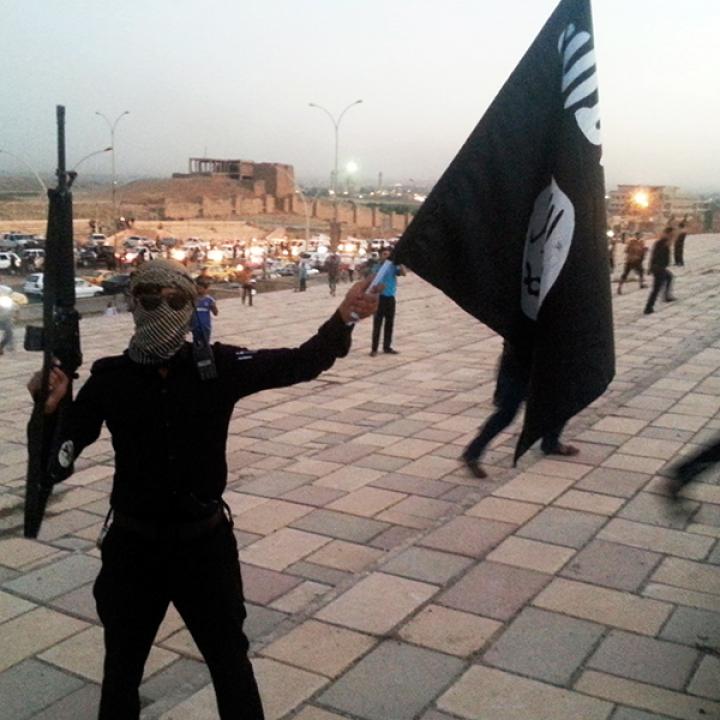
- Policy Analysis
- Articles & Op-Eds
Taking Advantage of the Fall of Ramadi

An Iraqi journalist explains why resolving the political causes underlying the expansion of ISIS is just as important as combating the group militarily.
The political and military scene in Iraq took a dramatic turn last week with the fall of Ramadi, the capital of Anbar province in western Iraq, to the Islamic State of Iraq and al-Sham (ISIS). Iraqi troops fled the city after days of heavy fighting with ISIS militants, during which hundreds of soldiers and civilians were killed.
Iraq has been struggling with the expansion of ISIS since Mosul, its second-largest city, was taken over by the group in June 2014. With the recent loss of Ramadi, the level of confrontation has reached an alarming point. ISIS is gaining more land, getting closer to Baghdad, and, contrary to what the Pentagon claims, is capable of launching attacks and advancing deeper into Iraq.
What happened in Ramadi was a huge setback to Prime Minister Haider al-Abadi, who launched a campaign to liberate Anbar from ISIS in early April. As a result, Abadi was forced to call the Popular Mobilization Units (PMU), a Shiite militia trained and armed by Iran, into action. This is not just a military setback, but also a political one that has left him vulnerable to Iranian allies in Baghdad. Abadi previously agreed with the Obama administration's efforts to rein in the PMU; now he is desperately in need of the militia's manpower to retake Ramadi.
Abadi has faced several political challenges since becoming prime minister in September 2014. Nouri al-Maliki, his predecessor, left a legacy of tension between Iraq's political groups. The advance of ISIS and the corrupt government apparatus have been a burden on Abadi's cabinet. In addition, Maliki and a number of PMU leaders have been working on weakening the prime minister to gain more power within the Shiite coalition and among the Iraqi Shiite community. The recent defeat in Ramadi provides them with a lot of fodder, for they can now paint a picture of Abadi -- in the eyes of his fearful Shiite constituency -- as a shaky, compromising leader who is weak against the Sunnis and the Kurds.
Shiites mostly view Iran as their protector, and the PMU as the only force that can defeat ISIS. Abadi's reliance on U.S. military and political support has not helped counter the PMU's growing popularity, and as a matter of fact, there is growing skepticism about the significance of the United States in the fight against ISIS. During the battle in Ramadi, Vice President Joe Biden promised to expedite the shipment of heavy weaponry to Iraq, but this never happened. And while Iraqis hear about U.S. promises to Baghdad and read reports about American raids against ISIS, they do not see any tangible results of such efforts. At the same time, Iran has offered unconditional support to Iraq, and the Iranian defense minister visited Baghdad a day after Ramadi's fall, offering all sorts of logistic and military aid to the government.
When comparing the two, the Iranians clearly come out on top, while the Americans seem reluctant and slow in providing assistance. If the United States is truly committed to preventing the Iranians from gaining more ground in Iraq, then providing only air support to Iraqi forces while pressuring Abadi to curb the PMU is not enough. The prime minister is simply too weak.
Abadi is similarly hampered in the north. While his government has shown a genuine desire to solve its problems with the Kurdistan Regional Government (KRG), striking deals over oil revenues and the transfer of federal funds, there remain a number of unresolved issues. For instance, Congress authorized sending weapons directly to the Kurds given the threat posed by ISIS, a decision that Baghdad has firmly rejected.
Iraq is now at a crossroads. The effort to retake Ramadi and its aftermath will be decisive in shaping the future of the country. The outcome of the battle, which will be fought by the PMU and the Sunni tribes of Anbar, should be used politically to defuse sectarianism and begin a new stage of power sharing. This would enhance the morale of the Iraqi army and, with enhanced cooperation between Sunnis and Shiites, might allow the government to gain the confidence of those Sunnis living in ISIS-controlled territory. This kind of understanding would require serious efforts, but achieving it might save Iraq from fragmentation
Here is where Washington comes in. The United States can do more than supplying weapons and aerial support, both of which are crucial. It should take advantage of the new situation to call for an urgent meeting between Biden and top Iraqi leaders, perhaps in Erbil, to implement a coherent and comprehensive plan to address all of Iraq's problems. Resolving the political causes underlying the expansion of ISIS is equally important to combating the group militarily. This is a turning point that must be dealt with wisely.
Ali Adeeb Alnaemi is an Iraqi journalist who previously worked for the New York Times in Baghdad. This article was originally published on Fikra Forum.
Fikra Forum
